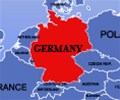

The German economy is on track for a lasting, probably stronger recovery in the third quarter driven by lively domestic demand after gross domestic product expanded by 1.5% on the quarter from April to June, the finance ministry said on Friday.
A third wave of coronavirus infections and a longer-than-expected lockdown caused the economy, Europe’s largest, to shrink by 2.1% in the first three months of the year compared to the previous quarter.
The finance ministry said in its monthly report that sentiment surveys and forward-looking indicators such as truck toll mileage pointed to “unbroken optimism” among businesses and high activity in the economy over the summer months.
The re-opening of the economy and falling COVID-19 cases in early summer have pushed up household spending which translated into booming retail sales in May and June, it said.
The economic recovery has also lifted tax revenues, though accumulated tax revenues from January to July are still 1.7% lower compared to the same period in the pre-pandemic year of 2019, the ministry said. This shows what a large hole the pandemic has blown in Germany’s public finances.
Finance Minister Olaf Scholz got the green light from parliament to suspend debt limits in the constitution to allow record new borrowing of up to 240 billion euros this year and more than 130 billion euros last year.
Scholz, the centre-left Social Democrat candidate to succeed conservative Angela Merkel as chancellor in a September election, has proposed suspending the debt brake for a third year in a row in 2022 to allow additional borrowing of nearly 100 billion euros next year.
Source: Reuters (Reporting by Michael Nienaber; Editing by Madeline Chambers)